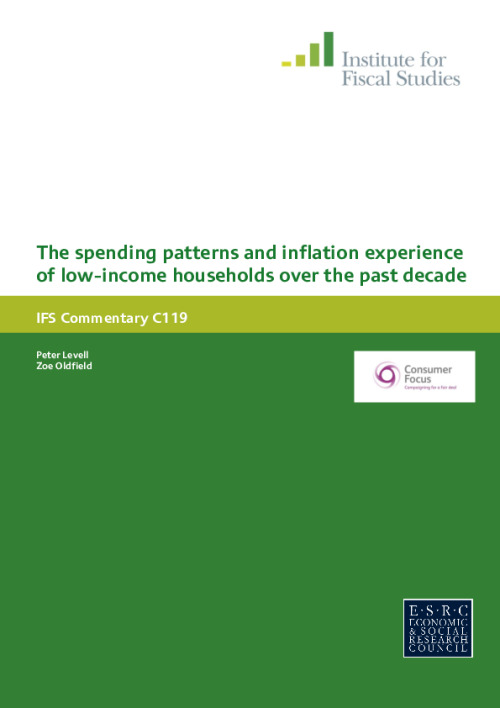Downloads

comm119.pdf
PDF | 834.22 KB
<p><p>This Commentary analyses recent trends in household spending, with a focus on domestic fuel and water, and examines the impact of changes in the price of these goods on household inflation, particularly for those on low incomes and those for whom state benefits make up the largest component of their income ('benefit-dependent' households). </p><p></p><p></p></p>
Authors

Head of Data Services
Zoe is Head of Data Services. She joined the IFS in 1998 as a researcher and moved into Data Services in 2011.

Associate Director
Peter joined in 2009. He has published several papers on the microeconomics of household spending and labour supply decisions over the life-cycle.
Report details
- DOI
- 10.1920/co.ifs.2011.0119
- Publisher
- IFS
Suggested citation
Levell, P and Oldfield, Z. (2011). The spending patterns and inflation experience of low-income households over the past decade. London: IFS. Available at: https://ifs.org.uk/publications/spending-patterns-and-inflation-experience-low-income-households-over-past-decade (accessed: 30 June 2024).
Press release
More from IFS
Understand this issue

Sure Start achieved its aims, then we threw it away
15 April 2024

Social mobility and wealth
12 December 2023

How important is the Bank of Mum and Dad?
15 December 2023
Policy analysis

How do the last five years measure up on levelling up?
19 June 2024

Making mortgage guarantees permanent will help some first-time buyers, but only if they can afford a bigger mortgage
6 June 2024

What has happened to earnings since 2019?
31 May 2024
Academic research

Income inequality in Ireland, 1987–2019
28 June 2024

Components of the evolution of income inequality in Sweden, 1990–2021
28 June 2024

Labour market inequality and the changing life cycle profile of male and female wages
15 April 2024